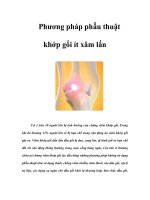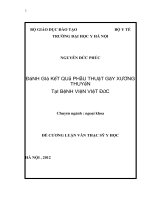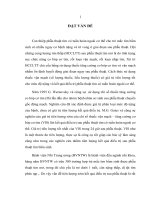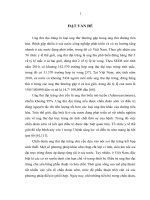Kết quả phẫu thuật tim mạch ít xâm lấn tại viện tim mạch quốc gia việt nam
Bạn đang xem bản rút gọn của tài liệu. Xem và tải ngay bản đầy đủ của tài liệu tại đây (1.32 MB, 17 trang )
MITRAL VALVE REPLACEMENT TECHNIQUES
IN MICS APPROACH
Duong Duc Hung, Pham Quoc Dat
Division of Cardiovascular Surgery
Viet Nam National Heart Institute
Bach Mai Hospital
Video assisted MICS
Conventional versus minimally invasive
mitral valve surgery
Minimally invasive mitral valve surgery
Advantage
•
•
•
•
•
•
Less pain
Less scaring
Rapid healing
Avoid sternal wound complication
Less blood loss
Lower LOS
Disadvantage
•
•
•
•
Cost/expensive technology
Limited indication
Ao clamp /CPB time longer
No diffrences in mortality, morbidity,
reoperation, long term survival
OUR APPROACH IN MINIMALLY
INVASIVE CARDIAC SURGERY ?
Advantage
Disadvantage
Strategy in MICS
Patient
Selection
Perfution
strategy
MICS
Techniques
Team
work
Patient Selection
Age < 50
NYHA I-II, EF > 50%
PAPs < 60 mmHg
MV disease
MV replacement
Age < 60
NYHA > II; EF > 30%
PAPs > 60 mmHg
MV disease
MVR/repair
Step by Step
Mitral Valve +
Tricuspid valve
Mitral valve
repair
Perfution Strategy
Canulation
• Central vs Peripheral canulation
• Venous Canulation: one ; two vs multi-stage
• Negative pressure
Cardioplegia
• Custodial – HTK
• Warm blood
Peripheral Canulation
Femoral A – Venous Canulation
Internal jugular vein canulation
Perfution Strategy
Canulation
• Central vs Peripheral canulation
• Venous Canulation: 1 ; 2 vs multi-stage
• Negative pressure
Cardioplegia
• Custodial – HTK
• Warm blood
Myocardial Protection
Custodiol
HTK
Warm
blood
Thoracotomy with mini-incision
Technique in MV replacement
Results
• Total: 24 Patients MVR
• Duration: 1/1/2016-1/10/2016
• Technique success: 100%
• Ao Clamp time: 59,25 ±20,5 mins
• CPB time: 104,75 ± 31,2 mins
• Extubation 1st day: 95,8%
• LOS hospital: 6,7 ± 3,2 days
RESULTS
• Post operative complications:
Mortality/Morbidity: 0%
Reoperation: 0%
• Echocardiography
No residual regurgitation
Gradient means: 5,6 ±1,2 mmHg
Thank you!









